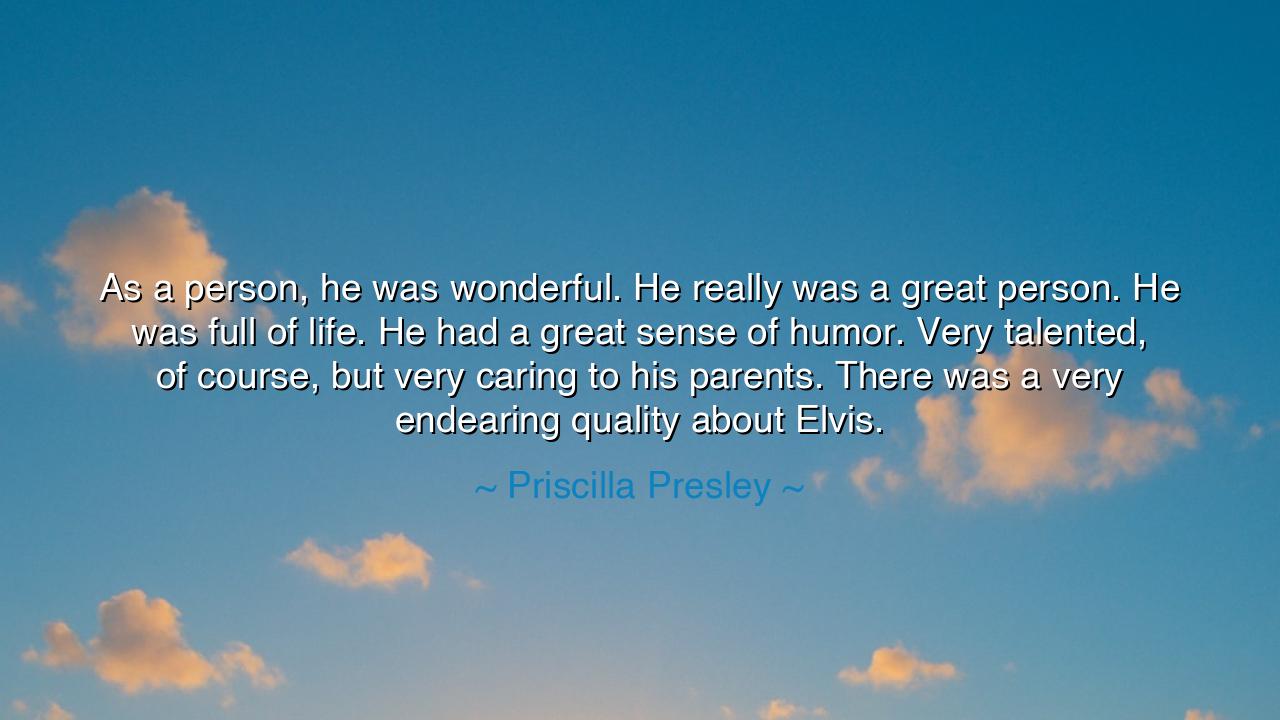
As a person, he was wonderful. He really was a great person. He
As a person, he was wonderful. He really was a great person. He was full of life. He had a great sense of humor. Very talented, of course, but very caring to his parents. There was a very endearing quality about Elvis.






When Priscilla Presley said, “As a person, he was wonderful. He really was a great person. He was full of life. He had a great sense of humor. Very talented, of course, but very caring to his parents. There was a very endearing quality about Elvis,” she was not merely remembering a man — she was invoking the spirit of a legend who, despite fame that reached the heavens, remained deeply, achingly human. Her words carry the tone of reverence and remembrance, not of an idol carved in stone, but of a soul vibrant with laughter, kindness, and love. In this tribute, we see the ancient truth that greatness does not come from power or glory, but from the warmth of the heart and the light of compassion.
The ancients believed that the highest form of greatness was nobility of spirit — the harmony between talent and tenderness, strength and humility. In Priscilla’s words, Elvis is remembered not merely as “very talented” — for talent is common among men — but as caring, endearing, and full of life. This is the mark of a true hero of the human heart: one who, while lifted high by destiny, does not lose touch with the ground beneath his feet. Like the philosophers of old who cautioned kings to rule with gentleness, Elvis, in his own way, lived as both monarch and man — crowned by music, yet ruled by love.
“He had a great sense of humor,” Priscilla says — a small phrase, yet heavy with meaning. Humor, as the wise of every age have known, is the language of the free soul. It is the laughter that rescues us from despair, the gentle mockery that humbles pride. For all his fame, Elvis’s humor revealed a boyishness that fame could not kill — the divine spark of playfulness that made him accessible to those who knew him. His laughter was not that of vanity, but of joy; not the laughter of arrogance, but of lightness — the laughter of one who could face life’s storms and still smile through the rain.
Yet perhaps the most profound part of Priscilla’s reflection lies in her remembrance of his devotion to his parents. She says, “He was very caring to his parents,” and in that sentence, we glimpse a man whose heart remained rooted in love and duty. The ancients would have called this pietas — the sacred virtue of honoring one’s family, one’s origins, one’s gods. For greatness without gratitude is empty. Elvis, though adorned in gold and adored by millions, never forgot the humble soil from which he rose. His reverence for his mother, Gladys, and his tender care for his father, Vernon, were not gestures of obligation but of genuine affection — proof that fame had not dimmed his humanity.
There is a story told of how, even at the height of his success, Elvis would often visit his childhood home, standing quietly outside the small house in Tupelo where his journey began. It was there that his roots whispered to him the truths he never forgot: that love, family, and laughter are treasures no stage or spotlight can replace. In this, Elvis becomes a mirror for all who chase greatness — a reminder that the truest stars are those who shine inwardly, whose light touches hearts, not just eyes.
Priscilla’s remembrance of his “endearing quality” reveals the mystery that all great souls share — a kind of childlike sincerity that survives the trials of life. To be endearing is to be real, to draw affection not through perfection, but through authenticity. It is the quality of those who live not to impress, but to connect; not to be admired, but to be loved. In her words, we hear not the echo of a public figure, but the music of a man whose greatness was inseparable from his gentleness.
The lesson, then, is timeless: Do not measure greatness by fame, but by the kindness that sustains it. Seek not to be worshipped, but to be remembered with warmth. Like Elvis, let your gifts serve joy, not pride; let your humor lift others; let your love remain steadfast even as the world changes around you. Be full of life, and never lose the tenderness that makes life worth living. For as Priscilla Presley reminds us through her words, greatness that endures is not the grandeur that dazzles, but the humanity that endears — the soft, luminous heart that, long after the music fades, continues to sing.






AAdministratorAdministrator
Welcome, honored guests. Please leave a comment, we will respond soon